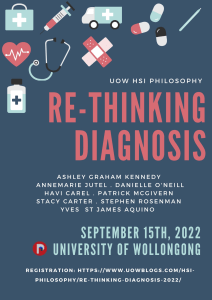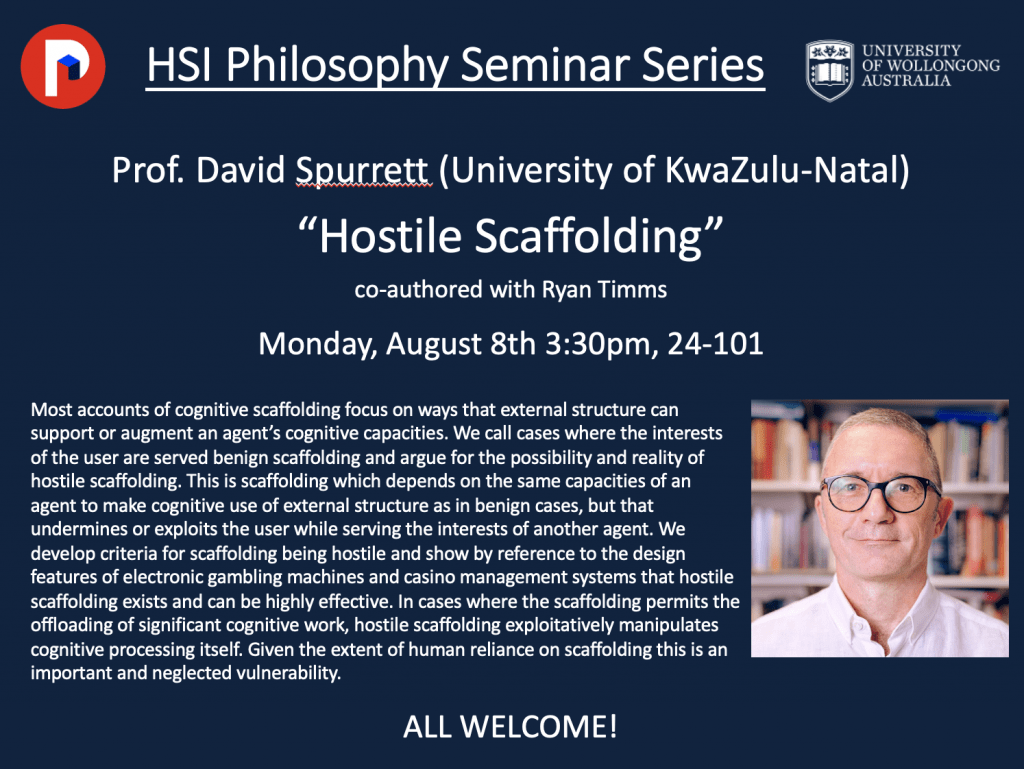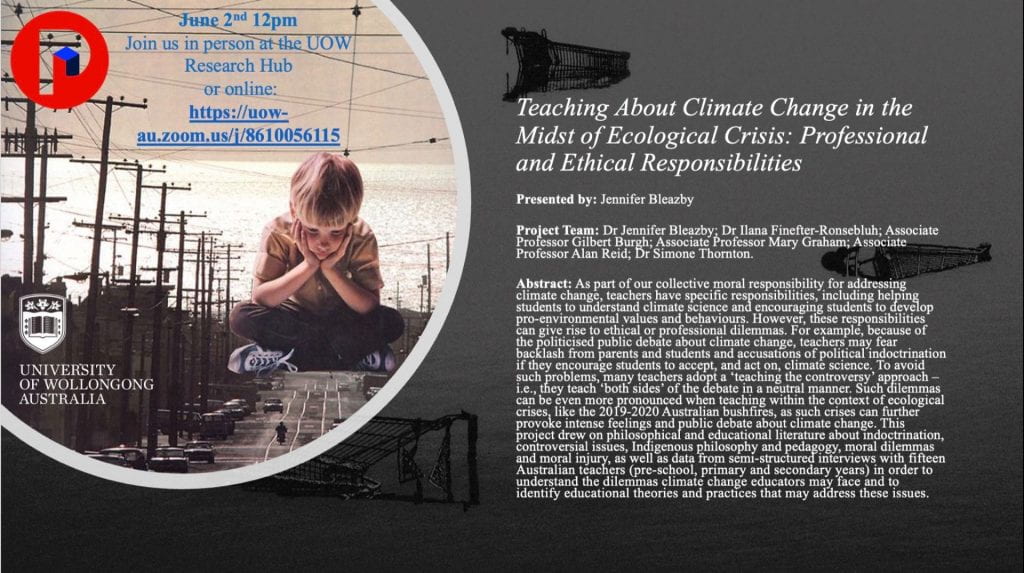Upcoming Conference: Re-thinking Diagnosis 2022
 HSI Philosophy is hosting a one-day conference on philosophical issues concerning the concept of diagnosis in medicine, September 15th 2022, 9:00am-7:30pm AEST.
HSI Philosophy is hosting a one-day conference on philosophical issues concerning the concept of diagnosis in medicine, September 15th 2022, 9:00am-7:30pm AEST.
This will be a hybrid event with a combination of in-person and online presentations. Talks will be held in room 2072B, building 19, University of Wollongong main campus.
Outside of medicine, it is often assumed that the concept of medical diagnosis is unproblematic and well-understood. However, if we look at the idea of diagnosis more carefully, we see that it is both much less clear and more problematic than first assumed. The aim of this conference is to explore philosophical questions at the intersection of practical and conceptual issues of diagnosis.
Speakers: Ashley Graham Kennedy, Annemarie Jutel, Danielle O’Neill, Havi Carel, Patrick McGivern, Stacy Carter, Stephen Rosenman, Yves Saint James Aquino
Registration is free and all are welcome. Please by register by completing this form:
https://forms.gle/eoAKiniufB7K4v2fN9
The conference is organised by Danielle O’Neill and Patrick McGivern. If you have any questions please contact Danielle.
Social Justice and E-Cognition: Reflections on Hosting a Hybrid Event
 In June 2022, Naomi Beecroft co-organised a terrific two-day hybrid conference on Social Justice and E-Cognition at the University of Wollongong, with funding from the Australasian Association of Philosophy and from HSI Philosophy at UOW.
In June 2022, Naomi Beecroft co-organised a terrific two-day hybrid conference on Social Justice and E-Cognition at the University of Wollongong, with funding from the Australasian Association of Philosophy and from HSI Philosophy at UOW.
Naomi is one of our current Philosophy PhD students, working on feminist e-cognition and implicit bias. Organising the conference was a huge undertaking, with 32 speakers from six continents! The conference was a tremendous success, with a wide range of talks and a lot of enthusiastic discussion.
However, organising events can also present significant challenges: here’s Naomi’s reflections on her experience, her advice for planning similar hybrid events, and the reasons she thinks hybrid events are important for creating conferences that are more accessible for everyone.
On the 9th and 10th of June, myself and my colleague Felipe de Carvalho at the Federal University of Minas Gerais hosted a hybrid conference – Social Justice and E-Cognition: Paths Forward – at The University of Wollongong. This was not only the first conference I had organised, but also the first major hybrid event I had attended. Here are my thoughts on hybrid events and the lessons that I’ve learned through the organising process. I share my experience in the hope of encouraging the uptake of hybrid events, whilst not underplaying the massive labour required to organise such events and the many, many difficulties academics and institutions need to recognise and commit to countering in future.
1. Don’t bite off more than you can chew.
Realistically, this event was too ambitious given our resources. We had a total of 32 speakers, from across North and South America, Europe, Africa, Asia and Australasia, over 10 hours, and across two days. In future, I would either run the conference over more days (which creates financial problems if you’re providing accommodation, or catering, or accessibility services), or run the conference for fewer hours (which mitigates some of the benefits of being online, as you lose some of your time window in which speakers in other time zones can be available). It’s a hard balance to strike.
2. Have access (contingency) plans organised in advance.
We worked very diligently to make things as accessible as possible, from finding a room that was both air conditioned and with openable windows to arranging for a live-captioning service. Some things took much longer than expected to finalise, and some happened extremely last minute, creating a lot of stress and chaos. My advice: have contingency plans in case things don’t go to plan. If you think that you might have accessibility services you pay for (for example printing in braille, a palantypist, interpreters) get companies and quotes in advance – better to have these things lined up and not need the service than to scramble for them last minute.
3. Recruit enough help – you’ll need it!
Hybrid requires more labour than a solely online or solely in-person event. In virtue of the fact that people can attend both physically and virtually, you will reach people with a greater geographical spread – which is great! But that also means emails and messages at all hours, a logistically complicated schedule, and a lot of people to work around. The bulk of this work was done by Felipe, who did a remarkable job of keeping on top of things and creating a schedule that worked as well as possible for as many people as possible, but this is ideally more than a one-man job.
On the day, you need people monitoring both the physical room and the virtual room. Make clear who is best placed to speak to for online attendees and virtual attendees, and stick to one platform. I was simultaneously monitoring three email addresses, Facebook, Whatsapp, Zoom, and the room itself, which wasn’t physically doable and meant that I dropped the ball a couple of times. Realistically, I think that for things to run smoothly you need one person handling comms and chairing virtually, one person in the room handling comms and another chairing, as well as another person managing things that might arise like issues with catering, IT, safer spaces and accessibility, and so on. And probably someone to spare, for good measure.
You will need a big, solid organising team. You will need people to run errands, call tech support, help you test and connect things, get coffee, and take turns at the reins for the sake of everyone’s energy.
4. Be creative with formatting.
Given our limited resources and the nascency of hybrid events, we stuck with a conventional structure of allotted presentation time + Q&A. While this may be effective some of the time, it can quickly get repetitive. It is imperative that we think of new formats for hybrid events. We already have enough experience with these events to realize that the traditional structure is not ideal for online conferences. We will need to be creative! For example, perhaps a speaker could upload a video of the presentation sometime in advance; participants would watch the video at their own time and pace, and we would then get together (both in person and virtually) to discuss the presentation. That would already save some significant online time. Another idea: to have round tables with 3 or 4 speakers on specific topics, with a moderator picking up questions from the audience and passing on to them. We have to try different things to see what works the best
5. (Probably) don’t talk at your own conference.
Depending on your personal capacity and how many people you have on hand actively involved in the running of the event, give serious thought to whether you also have the ability to speak at the event. I made the mistake of overestimating my capacity and underestimating the amount of labour I’d have to do, and so I wound up presenting old(ish) material in a near-delirious, sleep-deprived, high-anxiety state because I did not have the time to write and deliver what I wanted, and was not in the proper mental or physical state to do it well. During the week of the conference, I worked 12-16 hour days most days; I have a chronic illness and mental illness, and this pushed me beyond my limit.
6. Plan your days meticulously…and be flexible.
There is massive room for error with hybrid events and hiccups big and small are extremely likely. We had timetabling miscommunications, last minute cancellations, issues with accessibility tech, internet blackouts, catering issues, delays – things that just happen with large events, but with large hybrid events they can happen in both the virtual and physical space. You can do things to minimise the impact of these or avoid them happening altogether: confirm the day before everyone knows when and where they’re speaking, be prepared to shift the schedule, try have tech support on-hand, and always (always!) have a Zoom co-host.
7. Be extremely clear in your communications!
When working across countries, continents, time zones, and languages you need to be extremely clear about what is happening where, at what time, and for who. You need to be clear about what time zone you’re talking about, what day it is where, and give people access to time zone converters. This may sound extremely obvious, but it’s really easy for lines of communication to get crossed in ways that just don’t happen if you’re all physically at an event together.
All this being said, there are immense benefits to organising hybrid events, and even despite my own great difficulty with organising in that format, I think it is hasty and inappropriate to swerve back to in-person events without offering that hybrid option.
Hybrid events are especially valuable for marginalised researchers; for those with childcare commitments that make attendance difficult; for those who cannot reasonably afford travel, accommodation, and expenses to conferences; for disabled and chronically ill researchers, especially those who are still rightfully concerned about COVID; and finally, for those of us who are concerned with the ecological impact that frequent air travel has and the industry-wide expectation that we all participate in it.
The difficulties with hybridity by no means outweigh the benefits, but it does require that we are serious about the labour required and that we have the resources at our disposal. Whilst my account might feel negative, I want to be measured and realistic in recognising and meeting the demands. I wanted to share my perspective so that others can learn from my mistakes, and so that I can contribute to more accessible events in the future.
Upcoming Talk! Prof. David Spurrett (University of KwaZulu-Natal)
Join us Monday, August 8th in room 24.101 at 3:30pm for a talk by Prof. David Spurrett (University of KwaZulu-Natal): “Hostile Scaffolding” (co-authored with with Ryan Timms). All welcome!

New paper by HSI Philosophy PhD student, Cohen Brown
Big congratulations to HSI Philosophy student Cohen Brown on the publication of his paper, “Against Aggression? Revisiting an Overlooked Contender for Moral Bioenhancement” in the journal Neuroethics! This is a great achievement at the start of Cohen’s PhD!
Abstract: In moral bioenhancement (MBE) discourse, aggression has been identified as one potential target of biomedical intervention. Early suggestions that aggression might be modulated to improve moral outcomes were met with strong opposition from those claiming it is impossible to modulate aggression without harming traits of distinct social and agential value. If we are to preclude (or endorse) particular paths to moral enhancement then we ought to establish sound reasons for doing so. However, in paying due consideration to contemporary aggression studies we will see that current efforts to rule out aggression as one such path are untenable. I argue that the rejection of aggression-reduction as a viable target of MBE is a mistake, and that this arises from a rudimentary view of aggression which is incompatible with current scientific consensus. Drawing on contemporary psychological views I argue that it is necessary to distinguish subtypes of aggression, and that once these distinctions are recognised there is a potential space for MBE to target the biological correlates of specific kinds of aggressive behaviour. Ultimately, I suggest that aggression remains a legitimate target of inquiry, and that mitigating deleterious manifestations may yet offer one prospect for MBE.
Conference this week on Social Justice and E-Cognition
HSI Philosophy PhD student Naomi Beecroft has co-organised an outstanding conference this week on Social Justice and E-Cognition (June 9th & 10th). The conference will explore work at the intersection of e-cognition (embodied, enactive, extended, ecological and embedded approaches to cognitive science) and social justice philosophies (feminist, anti-racist, Marxism, disability, queer and decolonial theories). It features more than two dozen talks by philosophers from around the world, held in a hybrid format combining in-person and online presentations.
The conference is co-organised by Felipe Nogueira de Carvalho (Federal University of Minas Gerais) and supported by funding from the Australasian Association of Philosophy.
For more information, including the full program of speakers, look here:
https://philevents.org/event/show/97902
Upcoming talk!
Join us Thursday, June 2nd in Research Hub (19.2072B) or via Zoom for Dr Jennifer Bleazby’s talk: “Teaching About Climate Change in the Midst of Ecological Crisis: Professional and Ethical Responsibilities”

Hello again!
Just revving up the old blog…